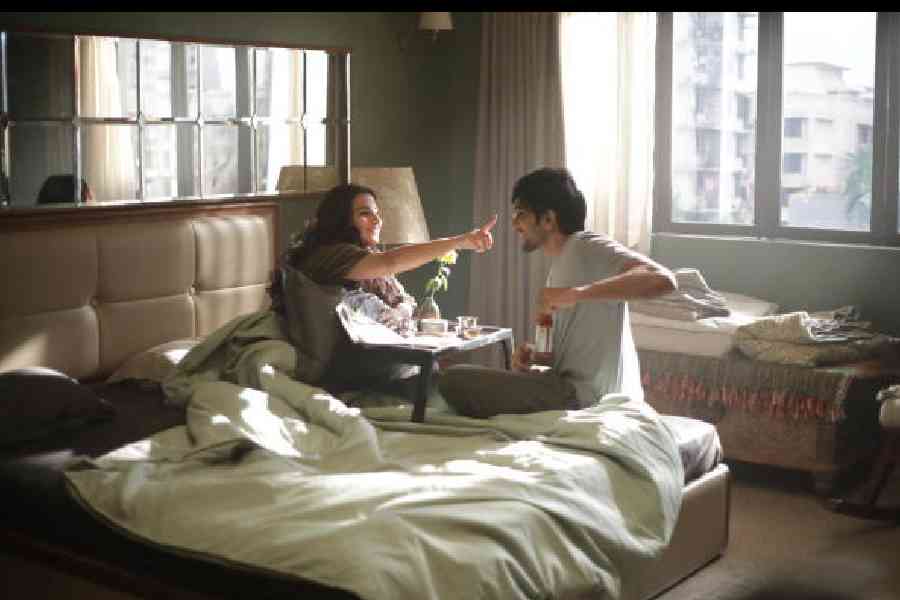A scene in Do Aur Do Pyaar — which also kicks off its trailer — has a married couple engaging in a shouting match that increasingly turns ugly. She spits out that she never liked a dish that he has consistently rustled up during the dozen years of their marriage. “Then why did you say you liked it?!” he asks her. “Well, that’s marriage,” she answers. He decides to pick on her habit of hoarding stainless steel utensils, commenting that their house looks like a grocery store. She screams back, he walks out.
The moment is reminiscent of that nasty showdown scene in Marriage Story — Noah Baumbach’s heartbreaking portrait of a family torn asunder — in which a couple, going through the beats of a divorce till then limited to impersonal interactions in lawyers’ offices — have a moment to themselves. The hesitant conversation quickly escalates into a fight. The barbs turn uglier by the minute, the complaints against each other sting of pain and frustration. It finally ends in a festering mess of tears, anger and regret.
Marriage is hard work. One doesn’t need a film to realise or reiterate that fact. What films like Marriage Story, Anatomy of a Marriage and now Do Aur Do Pyaar do is reflect what feels instantly relatable to many. In the unravelling of a marriage on screen, you find familiarity, often too close for comfort. Sometimes, if you allow yourself to be receptive enough, you could find redressal or remedy through that relatability.
Do Aur Do Pyaar is the official remake of the 2017 relationship drama The Lovers. Like that film, the central couple in Shirsha Guha Thakurta’s directorial debut are at the stage of marriage which is the worst — they are indifferent to one another. Once madly in love, Anirudh Banerjee (Pratik Gandhi) and Kavya Ganeshan (Vidya Balan) eloped against the wishes of her family and got married. Twelve years later, their sporadic conversations with each other involve discussing the size of garbage bags to be bought and the AC temperature in the bedroom that will suit both.
The two, however, have smouldering chemistry with their lovers — she with Vikram, a globetrotting photographer played by the dreamy Sendhil Ramamurthy; he with aspiring actress Nora (a charming Ileana D’Cruz).
Under pressure from their partners, both Kavya and Ani — married too long and reluctant to upset the status quo — are biding time, looking for an opportunity to spring the ‘D’ word at each other. But a sudden trip to hometown Ooty, where their romance started and grew, throws the two together in situations that rekindle their feelings for each other. Before long, they can’t keep their eyes and hands off each other. Now, they have to figure out a way to break the news to their respective lovers.
The first hour of Do Aur Do Pyaar is fun and frothy, despite the potential roadblocks you know the relationship(s) — and subsequently the film — will run into. Vidya and Pratik manage to conjure a lived-in chemistry that seems authentic when their marriage is both messy and mushy. Shirsha, along with writer Suprotim Sengupta, contextualises the source material to come up with some charming moments — the two unabashedly grooving to the ’90s hit Bin tere sanam is a gem, as is the scene where they bond by guessing what her (still) antagonistic family must be gossiping about them. It is these chuckle-worthy scenes that carry the film, with the makers using humour as a device to drive home some bitter home truths.
Heartbreak is inevitable in a story like this and when it happens — and unfortunately it happens for quite a bit of the film’s runtime — Do Aur Do Pyaar becomes too heavy for its own good. In the middle of the broken hearts and puffy eyes, there is a beautiful scene — where Kavya and Ani, battling feelings of betrayal and bitterness, dissect what went wrong in their marriage. It is a conversation that will hit home for many in the audience, in ways more than one.
Do Aur Do Pyaar is buoyed by some soulful music put together by the eclectic bunch of Lost Stories, The Local Train, Subhajit Mukherjee, Abhishek-Ananya and When Chai Met Toast. That is a definite win for the film as are its performances and cinematographer Kartik Vijay’s evocative play of light and shade.
At one point in the film, a broken Kavya asks her estranged father what it took for her parents to sustain such a long marriage. “You just show up every day,” he tells her. That, perhaps, is key. Show up, no matter what. And bring in the spice. But a little bit more than Kavya’s go-to chilli sauce.
Priyanka Roy
Which is your favourite film based on marriage? Tell t2@abp.in










